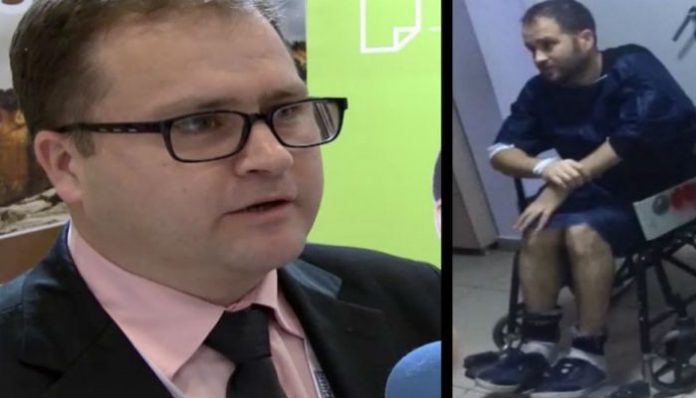
How I Survived Cancer in Prison
July 27, 2018This article was published in collaboration with the Marshall Project. Sign up for their newsletter.
The bleeding began in April 2013 and didn’t stop.
When I’d first arrived at Woodman Unit the previous summer, I’d undergone a series of tests during the intake process: blood draws, psychological evaluations, and a pelvic exam. After the initial flurry of activity, things moved more slowly. I had another pelvic exam two months later. When my second pap test showed abnormal cells, I was told I would be informed of any next steps— if I needed further treatment. I assumed the Texas Department of Criminal Justice* was responsibly directing my health care. I put my trust in the system to manage my life, a task at which I’d obviously failed. Once I was transferred to the San Saba Unit, my gynecological health slipped my mind, as it had for years.
Until the bleeding started. When it continued for a month, I submitted a medical request form for an appointment with the physician assistant, the closest thing to a doctor on staff at the prison. He did another pelvic exam and said, “I see that the bleeding is caused by a big lesion on your cervix.” I suddenly remembered those abnormal cells nine months earlier.
“What?” he said, surprised. “Why didn’t they treat it then?”
“You tell me,” I replied. He assured me I could expect to go on “chain” (slang for being transported along with other sick prisoners) to the hospital in Galveston within the next few days. “These things take a long time to turn into cancer,” he said. “Unless you’re in the free world.” His gallows humor disarmed me and I laughed out loud. He said I would be in and out of the hospital in one day, most likely.
It made me feel better for the moment. But not a word of it was true.
Each day I was not called for medical chain, I grew more anxious. Two weeks later, I requested another appointment. Two more weeks passed before I once again sat on a paper-covered exam table in the prison medical unit. The almost-doctor had no knowledge of my request, he said. He had called me in to review my lab results. “Your labs showed high grade SIEL,” he said. When I asked what that meant, he replied, “High grade squamous intraepithelial lesion.” It wasn’t exactly an explanation, but I understood it was bad news. Looking grim, and offering no comic relief, he said I would to go to Galveston right away. He’d made a note to expedite my transport. I should pull chain in the next few days, he said.
“I’ve been waiting for a month already!” I pleaded. “Only a few more days,” he promised.
A few more days came and went, then a few more weeks. Between the waiting, the bleeding and the uncertainty, my stress response bloomed in my stomach. Everything I ate made me sick. I tried to calm myself with healing visualizations. I tried to accept what I could not change.
But I was determined to have my condition addressed. I went back to medical several times in the following months. Each time I felt hopeful that I would finally get further medical attention. But I was never on the chain list.
Exactly four months after the physician assistant first told me “days,” I went not to the hospital in Galveston, but to Crain Unit in Gatesville, to see the prison OB-GYN. I hoped the shock I saw on the faces of the nurse and doctors during my pelvic exam would generate action. I overheard them talking to the officer outside the thin exam room door.
“Her lab results indicate a very serious condition that needs to be addressed immediately,” the young doctor said. “We cannot do a biopsy because the tumor is bleeding so heavily. Can you put her on a bus to Galveston from here?”
“Logistically it may not be possible,” was the officer’s response. “I’ll have to check.”
I was sent back to San Saba without comment. This time I felt sure I’d be on the next transport to Galveston. My stomach was in knots as I waited for the 10 PM announcement.
When I was not called, I was confused, outraged, and disheartened. How could they let me go on like this? I submitted yet another medical request. I knew something was desperately wrong. I was afraid and I was mad. Was I going to die in prison from a condition that could have been corrected with a 15-minute outpatient procedure months ago? Would anyone even notice? I hoped my best days were ahead of me. I looked forward to a new and sober life after my release. Would I live that long?
Anger spurred me to further action. When I received no response to my request, I wrote out a detailed timeline of my symptoms, appointments, lab results, and the many false assurances that I’d be treated “any day now.” I included the doctors in Gatesville saying I needed to go to the hospital immediately. At the top I wrote, “Duplicate copy to be submitted in potential lawsuit.”
Oh, how quickly those words got attention. Lawsuits in prison are difficult to win, but it was beginning to look—to me, at least—like an undeniable pattern of negligence.
Within four hours of dropping that timeline in the medical request box, I was sitting in the nurse’s tiny office. “It’s a good thing you alerted us to this,” she said, her eyes crinkled with concern. “The doctor’s instructions were written in the wrong place, so you weren’t ever on the chain list.”
“I’m bleeding constantly and it keeps getting worse,” I said. “I’m worried my life is at stake.”
She looked at me compassionately. “I’ve been working here for a while and I’ve never seen anyone fall through the cracks like this,” she said. Was that supposed to make me feel better, I wondered? “It’s not the way we usually operate,” she went on. “I mean, I know that you want to bring a lawsuit and I’m not saying you shouldn’t. I just want you to know that this isn’t the norm.”
“I don’t want to sue!” I said, frustrated. “I want medical treatment! My goal here is to save my life.”
Then the unit manager and the captain walked into the closet-sized office. I felt exposed and small as they loomed over me, formal and serious in their starched uniforms. I had an instinctive desire to get away, as if I were in trouble. But I was stuck in my plastic chair.
The captain spoke first. “We’ve been informed of your issues with medical and we want to apologize and let you know that we are working on arranging your transport,” he said. “You should be going very, very soon.”
My jaw dropped. He wanted to apologize? I’d never heard of such a thing.
That very afternoon, a guard roused me from a deep sleep and instructed me to bring only the essentials: toothbrush, shower shoes. “Another officer will pack your stuff,” she said. “Leave it. Let’s go now.” She shut the door on my belongings, my friends, and my home for the past year.
I was restrained in handcuffs and ankle chains for the seven-hour trip to Galveston. They rattled as I shuffled toward the van. With each awkward step I felt lighter, my spirit soaring with gratitude that I’d finally get medical attention. I walked away from all of the stress and the struggle toward this moment.
Three days later, I was officially diagnosed with cervical cancer, and began another long and arduous journey through radiation and chemotherapy. I received excellent care, and responded well to the treatment. The tumor melted away. I’d become a warrior. I fought first for my rights, and then for my life. I never gave up the fight.
*When asked for comment, a spokesperson for the Texas Department of Criminal Justice said in a statement that it “ensures that all of the 145,000 offenders in our system receive the highest level of quality health care. In addition to the medical care available at all of our unit infirmaries, offenders are also treated at our Hospital Unit in Galveston, TX and at certain private facilities. Our Health Services Division constantly monitors the delivery of quality care and investigates all medical grievances. Due to HIPAA we are unable to comment on the specifics of any individual medical case.”
Heather Hodges, 46, was slated for release from the Carole Young Medical Facility in Dickinson, Texas on July 27, 2018, after serving five years for drug charges. She is writing a memoir of her cancer survival and plans to create an organization for recovering addicts and rescue dogs to work together in focused, meaningful service.



